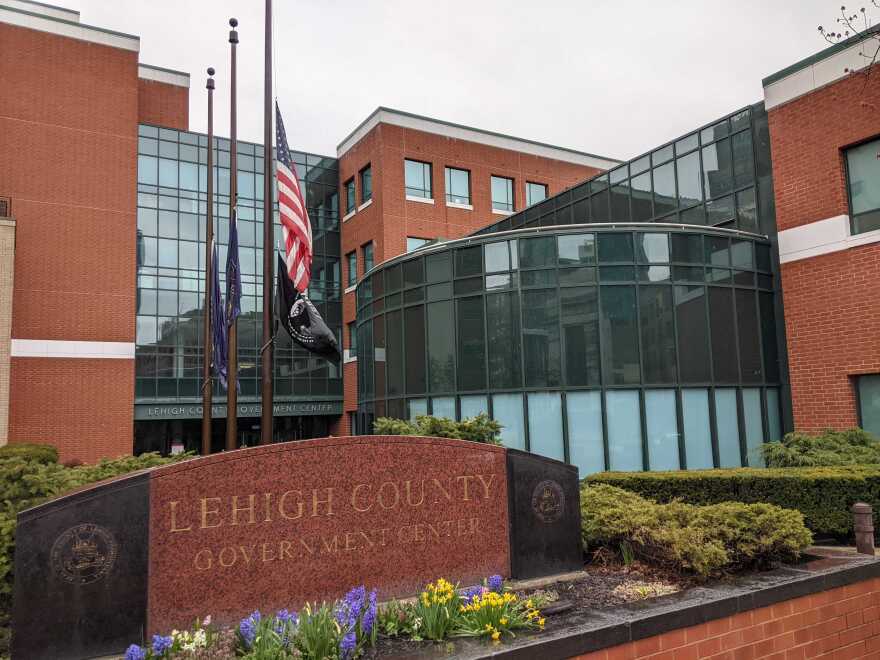ALLENTOWN, Pa. — The five new board members of the recently rejuvenated Lehigh County Redevelopment Authority met for the second time Thursday to lay down ground rules and get back to business.
And it's already working on its first project: the Iron Works Project in Catasauqua, which officials say could generate more than $1 million in additional tax revenues each year, and new jobs.
- Lehigh County's Redevelopment Authority went by the wayside about a decade ago due to a lack of work, officials said
- The authority was relaunched in April, with board members holding their first meeting a month later
- Members met Thursday to establish bylaws and begin work on their first project, the Iron Works Project in Catasauqua
The authority was first established in 1986, but it had been defunct for about a decade. Vacancies on the board were not filled and members were not reappointed because the Redevelopment Authority had no projects on which to work, officials said.
Lehigh County commissioners reconstituted the authority in April by approving about $134,000 to fund its work. That money is coming from the county’s Community and Economic Development Fund.
The county relaunched the RDA because several municipalities asked for its help with projects, according to the funding ordinance that commissioners unanimously approved after appointing five members to the authority.
Michael Yeager and Ricky Gower will serve through the end of 2025, while the terms of Steven Neratko and Oscar Ghasab expire at the end of 2024. David Weinstein is set to serve until the end of this year.
Putting people in place
Lehigh County Redevelopment Authority members met for the first time on May 4. The inaugural meeting saw members introduce themselves before hiring Kent Herman as solicitor and Chris Gulotta as contract manager.
Gulotta, who was executive director of the Cumberland County Redevelopment Authority for 30 years until 2010, said he is working on a contract basis to “fulfill executive director duties” for the newly reformed RDA.
The authority's purpose is to help eliminate “blighted areas through economically and socially sound redevelopment” and to “encourage the provision of healthful homes, decent living environments and adequate places for employment” in Lehigh County.Chris Gulotta, who was hired to serve as the RDA's "contract manager"
Members then elected Yeager as chairman, Neratko as vice chairman, Gower as secretary and Ghasab as treasurer, according to minutes from the meeting.
Yeager is a former chief executive officer of the Mutual Insurance Company of Lehigh County and serves as treasurer of the Lehigh County Housing Authority board, which Weinstein chairs.
Neratko is the chief community and regional planner for the Lehigh Valley Planning Commission; Gower is an executive for Truist and chairman of the Main Street Lehigh Valley Foundation; and Ghasab is a real estate agent and member of Allentown's Blighted Property Review Committee.
Getting down to work
RDA members met again Thursday to establish bylaws and dig into its first project.
Consultant Chad Helmer led a presentation on the Iron Works Project in Catasauqua, which played a major part in the county agency’s comeback.
The borough “expressed interest” in getting the county’s help on the project several years ago, but the RDA was not functioning at that point, Gulotta said.
A successful redevelopment of the property could generate more than $1 million in additional tax revenues each year, new jobs and “substantial long-term economic benefits” for Catasauqua.Consultant Chad Helmer
The property served as the site of Crane Iron Works from the 1830s until 1921, and much of it was torn down about a decade later, Helmer told RDA officials.
Several manufacturers operated on the property until the 1990s, and it has sat mostly vacant since the 2000s, Helmer said.
Catasauqua spent more than $10 million to open a building in 2017 for its municipal offices, as well as its fire and police departments.
The municipal building sits on a 1.27-acre lot on the property, and the borough is looking to sell off the other 10.6 acres to a developer, Helmer said.
Catasauqua officials entered into an agreement to sell the larger lot to the Dunn Twiggar Company in 2017 but that deal was terminated last summer, Helmer said.
A successful redevelopment of the property could generate more than $1 million in additional tax revenues each year, new jobs and “substantial long-term economic benefits” for Catasauqua, Helmer said.
The first of many projects
Lehigh County Redevelopment Authority now will work closely with borough officials to find the right project to anchor the downtown property, Gulotta said.
Municipalities are required by law to sell a property to the highest bidder, so the borough likely will pass the Iron Works property to the RDA for $1, with an expectation that Catasauqua would get money when the RDA sells it to a developer, Gulotta said.
That practice is allowed under the state's Redevelopment Cooperation Law, he said.
Transferring the property would let the RDA negotiate with private developers and consider their “track record” with similar projects and the quality of their proposals, rather than just their bidding prices, Gulotta said.
The RDA’s purpose is to help eliminate “blighted areas through economically and socially sound redevelopment” and to “encourage the provision of healthful homes, decent living environments and adequate places for employment” in Lehigh County, Gulotta said.
Gulotta said he thinks the Iron Works Project is the "first of many" the RDA will help bring to reality.


